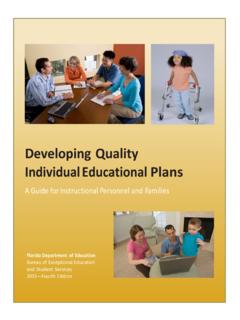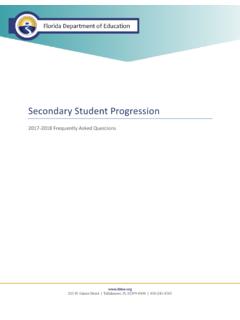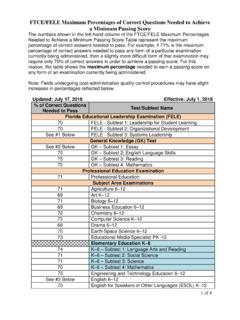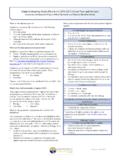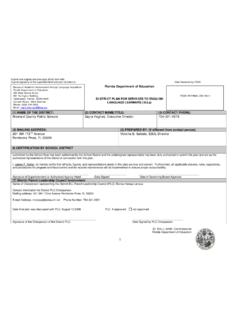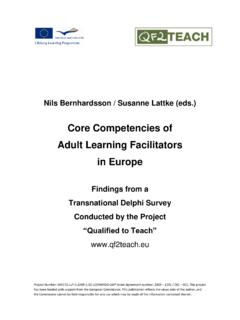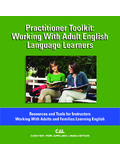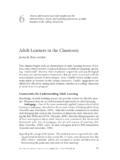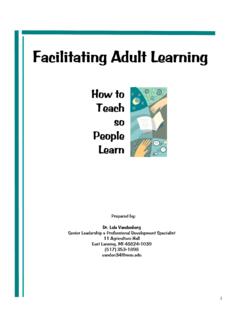Transcription of Accommodations and Modifications for Students with ...
1 Accommodations and Modifications for Students with Disabilities in Career education and Adult General EducationRevised 2011 This publication is produced through the Bureau of Exceptional education and Student Services (BEESS), Florida Department of education , through federal assistance under the Individuals with Disabilities education Act (IDEA), Part B, and is available online at For information on available resources, contact the BEESS Resource and Information Center (BRIC).BRIC website: Bureau website: : BRIC@ Telephone: (850) 245-0475 Fax: (850) 245-0987 Assisting Students with DisabilitiesMarty Beech, Systems InstituteFlorida State UniversityBureau of Exceptional education and Student Servicesand Division of Career and Adult EducationFlorida Department of EducationRevised 2011 Accommodations and Modifications for Students with Disabilities in Career education and Adult General education This document was developed under a grant from the Department of education (USDOE), with funding provided by the Adult education and Family Literacy Act of 1998 and the Carl D.
2 Perkins Act of 2006. However, these contents do not necessarily represent the policy of the USDOE, and you should not assume endorsement by the Federal document was developed with funding provided by Adult and Community education of Florida and the Florida Association of Career and Technical education in collaboration with the State of Florida, Department of education , Division of Public Schools, Bureau of Exceptional education and Student Services, and Division of Career and Adult education . Appreciation is extended to the following people who reviewed the document:CopyrightState of FloridaDepartment of State2011 Authorization for reproduction is hereby granted by the State System of Public education as defined in section , Florida Statutes. No authorization is granted for distribution or reproduction outside the State System of Public education without prior approval in department oF educationJanet AdamsStudent Support Services Sheila GritzBureau of Exceptional education and Student ServicesMark BairdDivision of Career and Adult education Jane Silveria Division of Career and Adult EducationPam ShrethsaDivision of Career and Adult EducationJohn McNeeleyDivision of Career and Adult education Liaison to The Florida College SystemFlorida School diStrictSLiz CooperExceptional Student EducationPasco County School DistrictDiane RobertsFDLRS/Transition SpecialistManatee County School DistrictBettie StephensonManatee Technical InstituteManatee County School DistrictJoy SuldoTransition Program SpecialistOsceola County School DistrictparentSusan DunbarTallahassee.
3 FloridaTable of ContentsIntroduction .. 1 Chapter One: Important Information .. 3 Educational Programs .. 4 High School Completion Options for K 12 Students .. 7 Support for Students with Disabilities ..12 Legal Basis ..14 Eligibility ..15 Decisions about Accommodations and Modifications ..19 Student Responsibilities ..21 Summary ..22 Chapter Two: Instructional Strategies ..23 Understanding the Needs of Individuals with Disabilities ..23 Managing Time and Classroom Activities ..25 Teaching Techniques ..26 Assessment Practices ..32 Summary ..35 Chapter Three: Accommodations ..37 Assistive Technology ..38 Instruction and Assessment ..38 Learning and Work Environment ..50 Job Requirements ..52 Summary ..58 Chapter Four: Modifications ..59 Impact of modification ..59 Modified Occupational Completion Points ..60 Summary ..62 Chapter Five: Getting Started.
4 63 Start with the Individual ..63 Anticipate Student Needs ..65 Plan for Each Activity ..66 Collaborate with Others ..68 For Additional ..71 Appendix A Florida Administrative Code and Florida Statutes ..73 Appendix B Resources ..77 References ..871 INTRODUCTIONThis document updates Accommodations and Modifications for Students with Disabilities in Career education and Adult General education Programs published by the Florida Department of education (FDOE) in 2005. This document is written to assist school district personnel when making decisions about the use of Accommodations and Modifications by Students with disabilities in instructional situations. The first chapter includes information about the educational programs and available support for Students with disabilities. This section also describes legal requirements, eligibility considerations, decisions about Accommodations and Modifications , and student responsibilities.
5 The second chapter describes effective instructional strategies and assessment practices teachers can use to meet the needs of diverse learners. The third chapter presents an explanation of different types of Accommodations and related student characteristics in typical instruction and assessment situations and in learning and work environments. Specific information is provided about Accommodations on the fourth chapter explains the potential impact of modifying outcomes for programs and describes the process and purpose of modified occupational completion last chapter addresses implementing and monitoring the effects of using Accommodations and Modifications . The appendices include a list of relevant Florida Statutes and rules and resources that provide additional information about Accommodations and Modifications . CHAPTER ONEIMPORTANT INFORMATIONE ducational ProgramsHigh School Completion Options for K 12 StudentsSupport for Students with DisabilitiesLegal BasisEligibilityDecisions about Accommodations and ModificationsStudent ResponsibilitiesMany youth and adults with disabilities are enrolled in career (vocational) education and adult general education programs offered in high schools, technical institutes (career and technical centers), adult and community education centers, and institutions within The Florida College System (also known as Florida colleges).
6 A student s disability may affect what the student is able to do in school. In K 12 programs, Students with disabilities (identified through a referral process) may be eligible for Accommodations (described in a 504 Plan under the Rehabilitation Act) per Rule , Florida Administrative Code ( ). In addition, some K 12 Students with disabilities may be eligible for special education services and supports identified in an individual educational plan (IEP), as required by the federal law, Individuals with Disabilities education Act (IDEA), and Rule , In both situations, parents must give consent for: (1) evaluations to determine eligibility; and, (2) services. However, in postsecondary programs, Students with disabilities must 3 Accommodations and Modifications for Students with Disabilities in Career education and Adult General education Programsdisclose their disability and provide required documentation to become eligible for and receive Accommodations and services, as required by federal laws Section 504 of the Rehabilitation Act and the Americans with Disabilities Act (ADA).
7 This manual is written to help instructors in these programs understand two important features of services available to Students with disabilities: Accommodations and stated, Accommodations change the way the student is instructed or tested. Modifications change the outcomes or what the student is expected to learn. In this manual, you ll learn more about these two words. You ll see many examples of Accommodations and learn about the role and impact of Modifications . You ll also read about how determinations are made about Students needs for Accommodations and Modifications . Finally, you ll learn about the importance of continuous planning and collaboration to prepare Students for chapter provides a brief explanation of the career education and adult general education programs available for Students with disabilities. Definitions and examples are used to clarify the difference between Accommodations and Modifications .
8 The legal basis, eligibility, and a decision-making process are Programs Students with disabilities have access to a wide range of secondary and postsecondary education programs. Many are enrolled in traditional college preparatory programs in high school and go on to a college or university to earn degrees. Students may choose to pursue a career goal that begins in high school and continues in a technical institute (career and technical center) or one of Florida s colleges. Adult Students with disabilities may also choose to further their education and enhance their optimal functioning by enrolling in an adult general education program or a specialized adult program. Secondary programs must provide the Accommodations , aids, and services needed by high school Students with disabilities, as required by IDEA, the Rehabilitation Act, Rule , , and Rule , In postsecondary programs, Students with disabilities have a right to reasonable Accommodations according to Section 504 of the Rehabilitation Act and the One: Important InformationCareer education in K 12 and Postsecondary ProgramsCareer education provides a range of programs for Students with and without disabilities.
9 These programs begin with exploratory instruction in courses at the middle school level that give Students exposure to occupations and assist them in preparing their academic and career plans. In high school, practical arts courses are offered through career and technical education programs to help Students develop generic skills that apply to many occupations. High schools also provide job preparatory instruction to prepare Students for entry into specific occupations. These programs may include work experience, directed study, on-the-job training, and leadership skills. Student participation in a career organization is often an integral part of this Students with disabilities may enroll in regular career education programs, specialized career education (vocational education ) courses for Students with disabilities, or exceptional student education (ESE)/vocational education courses.
10 In career and technical education programs, the regular job preparatory curriculum identifies occupational completion points (OCPs) representing established groups of competencies and skills designed for a specific occupational outcome. OCPs may be modified for secondary Students with disabilities resulting in an individualized program leading to specific jobs. These curriculum Modifications , known as modified occupational completion points (MOCPs), apply only to high school Students with disabilities who are seeking a standard or special diploma. MOCPs may not be used in programs requiring licensure or certification (Rule ).At the postsecondary level, courses and programs of study enable Students to master career and technical competencies needed for entry into specific occupations or for advancement within an occupation.

